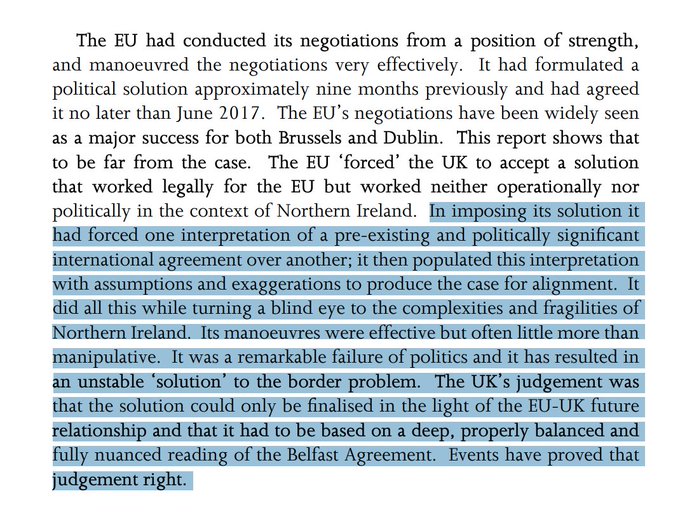Tom McTague: Britain was extraordinarily badly led

By Tom McTague
Two important pieces have recently been published on Northern Ireland that shed more light on both the UK’s catastrophic failure and, in my view, the cost of the European Union’s partial interpretation of the Good Friday Agreement. The first is by Policy Exchange and 2nd by Ireland’s former permanent representative to EU. Some thoughts
Tom McTague
Chief UK Correspondent for Politico
Staff Writer at The Atlantic.
Co-author of Betting the House: The Inside Story of the 2017 Election, with Tim Ross
“Decent enough chicken”—Ken Clarke
Roderick Crawford’s account for Policy Ex is devastating for both Her Majesty’s Government and Theresa May. He shares a lot of my plague-on-both-your-houses analysis. The current crisis in Northern Ireland is the consequence of British weakness/failure and EU strength/irresponsibility
The root of the current difficulty in NI (beside Brexit) is the EU/IRE pushed an unbalanced interpretation of the Good Friday Agreement which the UK eventually signed up to even though it disagreed. This was then locked in with the Dec 2017 joint report. Often overlooked
Crawford: “Making this agreement without reciprocal commitments to secure the balance of the Belfast Agreement and accommodate the UK dimension to Northern Ireland was the origin of the core flaw in the Northern Ireland Protocol.”
Crawford notes that the attempt to rebalance the joint report was made up solely of UK-only commitments: “The EU deliberately did not sign up to support East-West cooperation or to protect the UK internal market — these were solely UK commitments.”
A solution in which NI maintains alignment with the EU “was based on an Irish interpretation of the Belfast Agreement… [that] excluded Northern Ireland’s integration in the UK… it was one-dimensional and therefore entirely unbalanced.”
The CRUCIAL point: “The EU ‘forced’* the UK to accept a solution that worked legally for the EU but worked neither operationally nor politically in the context of Northern Ireland.”
*not forced—May could have fought and made case for no-deal to parliament.

Conclusion: “Failure to accept balance of [GFA] & the complex realities of NI is at the heart of the current trouble.. & the fault for that lies in part in Dublin, even if the responsibility must ultimately lie in the negotiating ‘success’ of Brussels and the UK’s failure.”
Onto Rory Montgomery, reviewing Barnier’s account of the Brexit negs in the Dublin Review of Books. He takes a different view to Crawford, but lands a few subtle digs at Barnier and Brussels that, I think, are telling.

Montgomery is a former Perm Rep to EU. He notes that alternatives to what emerged were looked at: “For the first six months after the referendum the Irish government was prepared to look at the possibility of some checks and controls on the island…”
“…there were avenues which might have been explored. Would low-key activity some distance from the border itself have posed a serious risk of violence? In no deal planning, these issues again presented themselves, but fortunately did not eventually require any decisions.”
Eventually, it became IRE’s position that “any checks or controls anywhere on the island would constitute a hard border.” This then informed the Commission’s position. It is fair to ask whether this is a reasonable position in light of the GFA—and not asked enough
Why did they change. Partly May. “One good reason for our changing our position was the emphatic way in which Theresa May had set out her red lines, which would clearly lead to very significant divergence between the UK and EU.” HOWEVER…
“Another was that regular Commission officials (not Barnier and the taskforce) adopted a completely orthodox approach to the full application of EU law… We would have been banging our heads against a brick wall had we continued to look for more flexibility at that time.”
Montgomery concludes: “This is speculation, and on balance there was probably no practical alternative to what did emerge: **but there is no sign that Barnier ever asked himself the question**.” (My asterisks)
This, I think, is subtly damning. Britain was extraordinarily badly led. But choices were made by the EU and Barnier as well, neither of whom give the impression of grasping the political sensitivity required to achieve consensus in NI. Each deserves blame, as does the UK.




